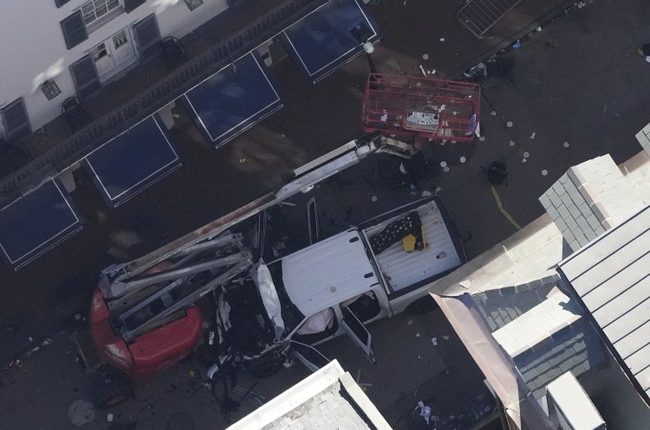
After initially denying that the attack in New Orleans in the early morning hours of New Year’s Day was a terror attack, and then belatedly admitting that obvious fact, the FBI is now confronted with the onerous task of investigating what was actually an Islamic jihad attack.
NBC News reported early Wednesday afternoon that “four senior law enforcement officials briefed on the matter say they have preliminarily identified the suspect in the vehicle ramming attack in New Orleans as Shamsud Din Jabbar, 42.” Din Jabbar is “accused of intentionally plowing a pickup truck into New Year’s revelers at about 3:15 a.m. on Bourbon Street, authorities said. The suspect is dead, the FBI said.” In his vehicular jihad attack, Din Jabbar murdered at least ten people and injured dozens of others.
The mysterious flag on the back of the truck Din Jabbar was driving seems to have been a flag of the Islamic State (ISIS). If that is definitively confirmed, it would not be surprising at all, for ISIS has called for vehicular jihad attacks as far back as 2014. In a long communiqué encouraging individual Muslims to carry out jihad attacks in Western countries, it quoted the Qur’an: “O you who believe, take your precautions, then advance the proven ones, or advance all together.” (4:71) Then it stated:
If you are not able to find an IED or a bullet, then single out the disbelieving American, Frenchman, or any of their allies. Smash his head with a rock, or slaughter him with a knife, or run him over with your car, or throw him down from a high place, or choke him, or poison him. Do not lack. Do not be contemptible. Let your slogan be, “May I not be saved if the cross worshipper and taghūt (ruler ruling by manmade laws) patron survives.”
Such attacks have not been common in the U.S., at least up until now, but they have happened. Back in May 2024, according to the New York Post, “a maniac tried to mow down Orthodox students and a rabbi outside a Brooklyn Jewish school Wednesday while allegedly yelling ‘I’m gonna kill all the Jews’ in a shocking antisemitic attack.” The name of the “maniac” was Asghar Ali, and “video footage supplied by the Flatbush Shomrim Safety Patrol shows the crazed driver revving his engine and mounting the curb as he swerved toward Orthodox Jews milling around a Yeshiva in Canarsie at about 11:25 a.m.” Nevertheless, “cops do not believe the attack is terror-related and…did not have evidence he was tied to radical groups online.” Well, that settles that.
Los Angeles’ KTLA reported in Oct. 2023 that “a woman was killed after a driver slammed into her, several other pedestrians and occupied cars in Long Beach on Saturday evening, and new information from police indicates that the crash may have been intentional.” The driver was named Khalid Yagobbi. At last report, cops were searching for a motive.
Related: [UPDATE] At Least Ten Dead in New Orleans Attack, FBI Now Says It’s Terrorism
Meanwhile, vehicular jihad attacks are far more common in other parts of the world than most people realize. In this article I listed a few recent examples of vehicular jihad, and there are many, many others. In Norway in Jan. 2024, a Muslim woman was jailed for 19 months for ramming the vehicle of a man who burned the Qur’an. In Austria in Nov. 2023, jihad terrorists planned a vehicular massacre at Vienna’s Pride parade. In Belgium in Aug. 2022, a man drove a van onto a terrace, injuring six people. Witnesses said that the driver screamed “Allahu akbar.”
In Bangladesh in Feb. 2022, a group of Muslims in a van targeted Hindus who planned to build a temple, murdering six brothers. And there have been numerous vehicular jihad attacks in Israel. A billboard in Nazareth actually called for attacks of this kind. “Moderate” Fatah also called for such attacks.
Despite the frequency of such attacks, Western authorities don’t seem particularly concerned about them. New Orleans had put up bollards to stop vehicular attacks, but they were down and in the process of being replaced when Wednesday’s attack took place. And no one is talking about why the bollards are necessary in the first place, and if vehicular jihad attacks are simply going to be a feature of life in the U.S. and all over the West from now on. That is a conversation that we urgently need to have.








